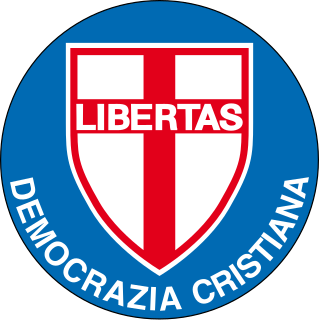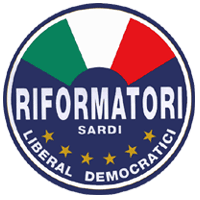Related Research Articles

Christian Democracy was a Christian democratic political party in Italy. The DC was founded in 1943 as the ideal successor of the Italian People's Party, which had the same symbol, a crusader shield. A Catholic-inspired, centrist, catch-all party comprising both centre-right and centre-left political factions, the DC played a dominant role in the politics of Italy for fifty years, from its inception in 1944 until its final demise in 1994 amid the Tangentopoli scandals. The party was nicknamed the "White Whale" due to party's huge organization and to its official color. During its time in government, the Italian Communist Party was the largest opposition party.

Democracy is Freedom – The Daisy, commonly known simply as The Daisy, was a centrist political party in Italy. The party was formed from the merger of three parties within the centre-left coalition: the Italian People's Party, The Democrats and Italian Renewal. The party president and leader was Francesco Rutelli, former mayor of Rome and prime ministerial candidate during the 2001 general election for The Olive Tree coalition, within which The Daisy electoral list won 14.5% of the national vote.

The Italian Republican Party is a liberal and social-liberal political party in Italy. Founded in 1895, the PRI is the oldest political party still active in Italy.
Liberalism and radicalism have played a role in the political history of Italy since the country's unification, started in 1861 and largely completed in 1871, and currently influence several leading political parties.

The Christian Democratic Centre was a Christian-democratic political party in Italy from 1994 to 2002. Formed from a right-wing split from Christian Democracy, the party joined the centre-right coalition, and was a member of the European People's Party (EPP).

The Democratic Party of the Left was a democratic socialist and social-democratic political party in Italy. Founded in February 1991 as the post-communist evolution of the Italian Communist Party, the party was the largest in the Alliance of Progressives and The Olive Tree coalitions. In February 1998, the party merged with minor parties to form Democrats of the Left.

The Democratic Alliance was a social-liberal political party in Italy.

The Italian People's Party was a Christian-democratic, centrist and Christian-leftist political party in Italy. The party was a member of the European People's Party (EPP).

Italian Renewal was a centrist and liberal political party in Italy.

The Sardinian Reformers is a liberal-conservative, regionalist, Christian-democratic political party in Sardinia, led by Michele Cossa. The party, which has always been part of the centre-right at the Sardinian regional level, is a keen supporter of the free market, competition, globalization and a two-party system.

The Democratic Union for the Republic was a short-lived Christian-democratic and centrist political party in Italy.
The Christian Democrats for the Republic was a Christian-democratic political party in Italy.

The Segni Pact, officially called Pact of National Rebirth, was a Christian-democratic, centrist and liberal political party in Italy. The party was founded and named after Mario Segni, a former member of the Christian Democrats who was a prominent promoter of referendums.
The Pact of Democrats was a short-lived electoral alliance of political parties in Italy.

Mariotto Segni is an Italian politician and professor of civil law. He founded several parties, which focused on fighting for electoral reform through referendums. He is the son of the politician Antonio Segni, one time President of the Republic of Italy.

The Pact for Italy was a centrist political and electoral alliance in Italy launched by Mario Segni and Mino Martinazzoli in 1994.

The Alliance of Progressives, also known as simply the Progressives (Progressisti), was a left-wing to centre-left political alliance of parties in Italy formed in 1994, with relevant predecessors at local level in 1993. The leader of the alliance was Achille Occhetto. The alliance was a predecessor of the modern-day centre-left coalition.
The Pentapartito, commonly shortened to CAF, refers to the coalition government of five Italian political parties that formed between June 1981 and April 1991. The coalition comprised the Christian Democracy (DC) party and four secular parties: the Italian Socialist Party (PSI), Italian Democratic Socialist Party (PSDI), Italian Liberal Party (PLI) and Italian Republican Party (PRI).
The centre-left coalition is an alliance of political parties in Italy active, under several forms and names, since 1995 when The Olive Tree was formed under the leadership of Romano Prodi. The centre-left coalition has ruled the country for more than thirteen years between 1996 and 2021.
References
- 1 2 André Krouwel (2012). Party Transformations in European Democracies. SUNY Press. p. 323. ISBN 978-1-4384-4481-9.
- ↑ Luciano Bardi; Leonardo Morlino (1994). "Italy: Tracing the Roots of the Great Transformation". In Richard S Katz; Peter Mair (eds.). How Parties Organize: Change and Adaptation in Party Organizations in Western Democracies. SAGE Publications. p. 266. ISBN 978-1-4462-6507-9.